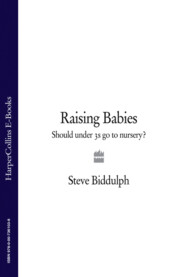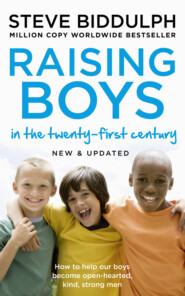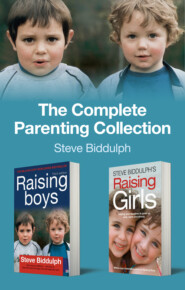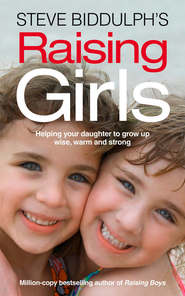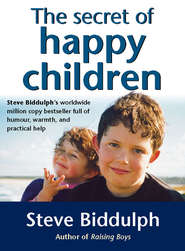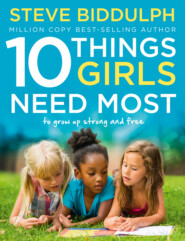По всем вопросам обращайтесь на: info@litportal.ru
(©) 2003-2024.
✖
The Secret of Happy Parents: How to Stay in Love as a Couple and True to Yourself
Автор
Год написания книги
2019
Настройки чтения
Размер шрифта
Высота строк
Поля
Foreword (#ulink_a06c5f20-297c-5b4e-83aa-94e9afa9c6a9)
This book was first written in 1988. We had been about ready to retire it, but kept meeting people in shops or in the street who said this was the book of all our books that really helped them the most. So instead of a dose of euthanasia, the book has been resuscitated, massaged, Viagra’d, and given a major renovation! Its aims are now much clearer, the language is simplified, its methods easier and more powerful.
The book’s goal is simple: to help you stay married, and enjoying it. And secondly, to help you raise children with a team approach, to survive the dramas and enjoy the delights that children bring. So instead of becoming a divorce statistic, you can be part of a social revolution: the breakthrough generation that learns to make relationships work.
There’s something else you should know. This is NOT a book about COPING with the family or fitting yourself in to make a tame and comfortable marriage. Nor is it about sacrificing yourself to conform to society’s wishes. It’s about how to turn the situations you are in right now – difficulties with sex, problems with partner communication, the challenges of children – into a fire-of-honesty which will burn away your hang-ups, your limitations, and leave you freer and more fulfilled than you currently might think possible. To have the kind of family life that (at least most of the time) makes you want to laugh out loud, and smile with pleasure for being in such a buzzing hive of human loving, clashing and growing. To break free from the modern madness of hurry-earn-and-spend, and get a life.
In raising a family, you can plumb the mysteries of life itself. There is no hotter furnace, no deeper pool to dive into than that of ‘married with kids’. This, ultimately, is a book about self-liberation: how to bring more love into your life, and into the world around you, where it is so desperately needed.
There’s something more you need to know. Good relationships take time and work; and anyone who tells you differently is lying. It may take twenty years for you to reach the ecstasy in loving that is possible for you and your partner. It may take years for you and your growing children to really understand each other. But if you follow what this books teaches, you will get glimpses and have moments, almost straightaway, that will let you know you are on the right track.
Love is hard. You will have to struggle to be honest, and risk rejection, over and over and over again. It will not always be comfortable; but it will be real, and the intimacy you build will be indestructible and unforgettable.
Some difficulties are necessary but confusion and loneliness are not among them. Our aim is to take away the confusion, to provide a map and tools for the journey. And to let you know through stories and examples that everywhere others are making the same journey, and their learning can be shared.
If you want your relationship – and your family – to thrive, without compromising your spirit, your heart or your values, then this book is written for you.
We hope you like it.
Steve and Shaaron Biddulph
Summer 1999
1 About Us, About You (#ulink_a2f681fd-6b31-572a-a316-c52485b650b0)
About Us
A book is really just someone talking: a very one-sided conversation. Since we are about to ‘bend your ear’ for a couple of hundred pages, you might well be wondering who we – the authors – are, and what we are like. So let’s get the embarrassing part out of the way!
We are very ordinary. Our house is never tidy, we laugh a lot, have been known to shout at the kids, we have fights with each other and lose the keys to the car. Aged in our late forties, we are getting old and funny-looking, and to the horror of our offspring, we don’t really care! We have lived together for twenty-five years and been married for the last sixteen of those. Our kids are fifteen and eight – a boy and a girl.
Steve grew up in a caring, but very emotionally constrained and rather isolated migrant family. (You guessed it – he’s English!) Shaaron is of Irish-German descent. She was born on the canefields of north Queensland, one of five little girls who, with their parents, had to struggle and work very hard to get by.
We were blue-collar kids who were lucky to grow up in the sixties when you could get an education, and advance in the world beyond the horizons of your parents. After a fairly bumpy adolescence, Steve trained as a counselling psychologist. Shaaron trained as a nurse and then a social worker. Looking back, the training was of limited value but we made some good friends, and it gave us something to do while we were growing up.
Steve specialized in families and children. Shaaron worked with deaf people, and before that, as a very young nurse, had to tackle the deep water of illness, death and bereavement.
Being thrown in the deep end at a young age turned out to be a plus. Unsure of ourselves but eager to do great deeds, we found that our patients appreciated our honesty in admitting that we didn’t know much. Not having much else to offer, we learned by listening very closely to people and looking carefully at every movement and expression, really wanting to understand life through those we were supposed to be helping.
By getting this close to our clients, we began to know and like them, often more than they liked themselves. Sometimes this approach of listening was helpful to the people we worked with. At other times, looking back, we were quite useless. But we never met anyone with whom we didn’t eventually feel some sense of a bond. This included ‘ordinary’ people, who were easy to like, but also people who were violent or criminal, even people who had killed others.
Counselling work is very absorbing. But after a few years we began to wonder if something was going wrong with family life in the late twentieth century. We were meeting hundreds of parents every year who had almost identical problems with their children. And hundreds of reasonable, caring couples who were struggling to keep their marriages alive. And this was just in one medium-sized country town (Launceston, Australia, pop. 62 000). Sometimes after a hard day’s work, you felt like calling a public meeting and saying: ‘What’s going on, guys?’ Or to put the question another way: ‘Why is family life so hard?’
Does normal mean ‘screwed up’?
To answer this question, for ourselves, as well as our clients, we read widely and also began travelling and talking to people in different countries. All through the 1970s and 1980s we travelled to observe childhood and family life, spending time in Calcutta in India, in remote villages in Papua New Guinea, and in modern cities like Singapore, San Francisco, Auckland and Beijing.
When we observed the lives of babies in the slums of Calcutta or in the bush of remote New Britain in the Pacific, we were struck by how contented and happy these babies and their parents often seemed. When we noted the lives of parents and children in childcare centres, schools, or suburban backyards in Australia and the US, we were equally struck by how unhappy they often were. The conclusion was alarming: as society got more materially privileged, childhood actually seemed to get worse, and the experience of parenthood somehow seemed harder.
In the West people had cars, health care, good housing and appliances. Our children did not die of preventable diseases and they got good educations. Yet we were time-poor, isolated, lonely and in competition instead of co-operation with those around us. We had traded our emotional wellbeing for material wellbeing and as a result the average Western family was in poor emotional health. In fact, it was dying of stress.
The question that arose was obvious: was it possible to have a materially good life AND live in the more joy-filled and connected way of people in more traditional societies?
In 1984 Steve wrote a book called The Secret of Happy Children, which espoused a more loving and positive style of parenting, at a time when books were more concerned with ‘taming’ children (or in other words, getting them to fit in with adults’ crazy lives). Quietly and without fanfare, Secret became popular all over the world.
The original edition of this book was our second one. Writing it together took many arguments and discussions, and so took a long time! By 1998 we had seven books, published in fifteen languages, in almost two million homes.
These days we are older and with our own children half-raised, we are starting to relax a little and not feel like we are solely responsible for saving the world. We feel ourselves to be a small part of a large social shift – parents gaining in their sense of worth, men reclaiming their place in the family, childhood becoming less oppressive and more secure.
We feel that the best results come not from frantic activism but from going calmly, thinking deeply and living your beliefs, as well as trying to pass them on. We have continued to work to train counsellors, especially in the healing of trauma and abuse, and to teach parenting skills, especially parenting without violence. We work in a circuit of about six countries where our books are popular and organizations exist which share our goals. We sometimes look at our lives in awe. We have been very lucky, yet we have also had enough hardship and disaster to give us a strong feeling for anyone who is doing it hard. We simply feel that it’s great to be alive, to have kids, wonderful friends and to see the sun come up another day.
Can a book be a friend?
Reading a book can be a bit impersonal. When you are sitting down talking with someone face to face, then it’s easy to get their measure and to feel empathy with them. We may never meet you in person but we want to convey to you the care that went into this book, and hope it comes through in the pages that follow. We hope that a feeling of connectedness grows as you read on. To feel connected, and to feel special, is every child’s – and every person’s – birthright.
The toddler stepping out into the spring garden knows that the sun shines just for them. This book was written just for you.
About You
Now let’s talk about you! You’re probably right in the thick of it all. One day you woke up and you weren’t a child any more. You’ve made choices, made mistakes, made commitments, and most likely made children! You have lines on your face, and bits of you are starting to droop.
Is this your life?
When you’re young you have dreams that reach far into the future. But as a parent of young children, your dreams get a little more short-term. During these years, your fondest hope is probably of getting half an hour’s break and having a good lie down. A wild fantasy would be reading the newspaper right through or getting to bed with enough energy to make love to the stranger that is your partner. Before you know it, you’ve got teenagers and all the mental challenges they bring. If you’re not careful, life can be what happens to you while you’re too busy to make other plans.
Today, as you’re reading this, your family life may be going really well. Or you may be going through a difficult patch. If it’s the latter, this is hardly surprising: family life is tough and we get very little help. We do not have a tradition in our culture for making marriage work, only for making it endure, which is not the same thing. The saying, ‘You make your bed and lie in it’ was very big in the mid-twentieth century – hardly an introduction to the craft of love. Its companion saying ‘Children should be seen and not heard’ was not much of a guide to parenting either!
Because of the poor quality teaching that we get in human relationships, many people find family life to be a disheartening part of their lives. Researchers have found that many people feel more in control and successful at work than at home. Instead of being a harbour of comfort and security, home can be the place where you feel least successful.
PRACTICAL STEP 1: ACKNOWLEDGE YOUR SUCCESS
If you have been feeling overwhelmed or like a failure at family living then it is time you let yourself off the hook. Before we start to talk about how to make things better, it is vitally important that you recognize how much you are actually succeeding. If you and your kids are alive, and have most of your arms and legs, if no-one is dead or in prison (or even if they are) then you have done millions of things right.
Without discounting the mistakes which you may have made, it’s still a fact that you have related, communicated, given and received love, and generally succeeded well beyond your conscious knowledge. One day, this will be evident to you.
We are all pioneers, hacking our way through the wilderness of millennial family living where no generation has gone before. In the past, family relationships were often simply an appearance one kept up. People did not expect intimacy or authentic communication. Rules and clichés governed most interactions. Before World War II, marriage was often something that people endured. From the sixties onwards, everything suddenly was reversed. Marriage became a disposable item, to throw away if it didn’t work. Now as we enter the twenty-first century we may become the first generation on a wide scale with the knowledge and skills to make relationships work.
You and your family are part of this breakthrough struggle. Everyone around you is having the same experience. Moreover, nothing you do is wasted. You don’t ‘fail’ if a marriage ends, or a kid gets into trouble. Sometimes these things have to be gone through to get where you are going. As long as you keep going, learning and adapting, you can no more fail or go backwards in life than a tree can ungrow.
If you feel unhappy, guilty, miserable or stuck at a particular time, don’t just ignore this feeling. But do realize that you feel bad because part of you knows that something more is possible. Pay attention to yearnings, regrets and frustrations because they are all signs of the life force in you, and will actually motivate you to keep you moving on to something better, which you know is there.
A loving life or a lonely life?
An elderly woman we know has lived in a nursing home for many years. Her conversations centre mostly on her own discomforts, her irritations with her fellow inmates. Her life doesn’t seem to mean much beyond just waiting. Perhaps living in a nursing home has made her like this. Or perhaps she always was rather self-focused. It is sad, and a bit depressing, to visit her.
When our kids were little they once took their most precious possession – a pet baby wombat – to show this old lady. ‘Everest’ the wombat (don’t ask!) was wrapped in a blanket, in a shopping basket, and perhaps we should have explained more loudly just what was in the package as we sat it on the old lady’s knee! At the sight of a furry creature among the folds of the blanket she shrieked and almost threw it across the room. She doesn’t much like furry things.
Whatever adventures and passions this old lady once had are now not easy to reach. Her relatives will grieve her passing, but not a lot. They seem to be waiting for the relief of hearing that she has died. This is one kind of old age, one kind of life. Can you imagine what it might be like to grow old like this: out of touch, grouchy, self-obsessed and shut away from life?






